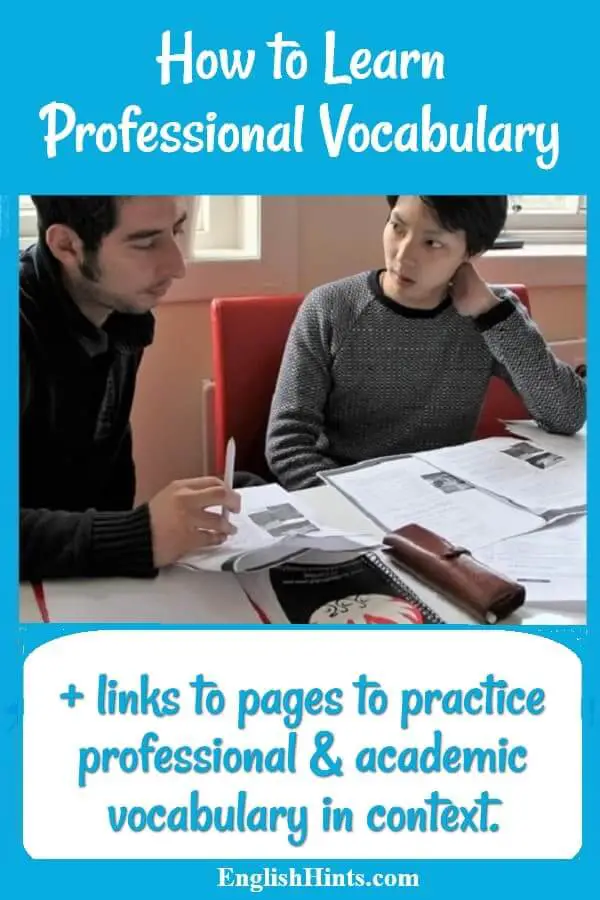How to Learn
Professional Vocabulary
Would you like to know how to learn professional vocabulary as effectively as possible, and how to practice it in ways that will help you remember it?
Knowing the specialized and technical vocabulary of your own profession is not enough.
You need to understand general professional vocabulary for university studies and for important exams like the IELTS and the TOEFL, but also for networking and interactions with professionals from other disciplines throughout your professional life.
This page will briefly discuss the best ways to learn and practice professional vocabulary. Then it will link to pages that demonstrate (and often provide practice) for vocabulary in different areas of professional and academic life and study.
What’s the key to learning professional vocabulary? Read, watch, or listen to English on interesting professional topics every day.
When you find a new word that you need to understand, try to guess its meaning from its context before you look it up. That will help you remember it.
So will making a mental image of its meaning. Possibly imagine something silly that is especially memorable, or a rhyme or story that connects it to a word you already know.
Then find ways to practice or use it immediately and over the next few days, in writing or when you talk. (If you don’t have someone to practice with, use it in your mind. Ask questions or make comments about it (mental, written, or out loud).
See Vocabulary Strategies for more effective study ideas. Building Vocabulary offers an easy way to keep increasing your vocabulary. Subscribe to our free English Detective newsletter for monthly suggestions for a few selected articles on a variety of topics of professional or general interest, as well as occasional crosswords or other related vocabulary practice.
How to Learn
Professional Vocabulary for Specific Disciplines
Students and professionals also need some specialized vocabulary.
Each section below is arranged with related pages together. They generally start with easier vocabulary. Later links go to pages with more difficult words to practice.
Business Vocabulary & Teamwork and Cooperation Vocabulary both explain and offer practice on words important for business. So does Money Words. Master Business English suggests other websites with language important for business.
Characteristics of Good Leadership and How to Change Someone's Mind discuss skills and demonstrate more vocabulary important for business people and professionals. (How to Change Someone's Mind also offers a free workbook with phrases and vocabulary important for persuasion and workplace problem-solving.)
Medical English is useful for health professionals. (Basic Medical Vocabulary gives the words patients and their families need too. Young people interested in science might study The Language of Research and Scientific Method Vocabulary. Both explain key scientific terms (from double-blind experiments and bias to data analysis and conclusions) and demonstrate them while explaining research procedures.
More Science & Psychology Vocabulary
• Science Crossword Puzzles (printable, plus one online interactive puzzle)
• Science Discoveries and Inventions
Social Science Vocabulary
• Vocabulary Building Games: Networking
• Secret messages: Spy and Code Vocabulary
• Understanding the News in English
• Words for Truth, Falsehood, & Error (and Answers)
• Vocabulary for Violence (It includes some very ugly words. Sorry, but you need to know them to understand the news in English.)
Practice Academic
Vocabulary (with Gap-fills)
Choosing the best word to fill each of the gaps (or blanks) is a good way to learn how to use these words—and see them in context. (A few of the pages in the categories above also have gap-fill exercises.)
Most of these pages use somewhat less common academic vocabulary—and a lot of words at once. Don’t start with these, but do try them once you know most of the more basic words above.
Conservation Terminology Practice (on global warming)
Disaster Assistance Vocabulary
Vocabulary Exercises: Organizations
More Vocabulary Exercises: NGOs
More Professional and Academic Vocabulary

• Top 100 List of Vocabulary Words
• Be a Word Detective (words relating to detective investigations-- + practice)
• Sherlock Holmes & the Language of Detection
• Practice 19 Words from the AWL (Academic Word List)
• Writing Test Vocabulary (explains and tests essential instruction words)
• Vocabulary from Classical Roots
• Practice Common Prefixes (This page and the next use many common academic words.)
• Practice (and Play with) Negative Prefixes
Biblical English talks about the English used in the King James Bible. (It's from 1611, in Shakespeare's time.) The page explains how it differs from current English. It discusses the use of ‘thee,’ ‘thou,’ and ‘thy’ (2nd person singular forms we no longer use.) It also explains canst, didst, and other verb endings we don't use anymore, and some words now used rarely.
Study the Academic Word List Systematically
University students might want to study the Academic Word List (AWL). You'll know many of these words, but it's handy to have them combined into one list. See Learn Academic Vocabulary for more details.
Use the Academic Vocabulary Word Lists 1, 2 (for newsletters 6-10), 3 (issues 11-17) or 4 (issues 18-23) if you want to study the entire AWL systematically. They link to related reading selections, talks, exercises, crosswords, and quizzes.
3 Ways to Learn the Academic Word List has more book & website suggestions+.
To practice particular words in the AWL, you can check the Academic Word List Vocabulary pages. They're alphabetical lists of the whole AWL.
They show the different forms of each word (access, accessible, etc.) and the newsletter(s) that practice that word. See Academic Word List Vocabulary A-B, C-E, F-M, N-R, or S-Z depending on the words you want to study.
Academic Vocabulary Test 1 and its Gapfill Test review many words in the first (most common) half of the Academic Word List.
See Online Vocabulary Games in English for vocabulary practice arranged by type of game. (It includes many pages with matching exercises and puzzles.)
Home > How to Learn Professional Vocabulary
Didn't find what you
needed? Explain what you want in the search box below.
(For example, cognates, past tense practice, or 'get along with.') Click to see the related pages on EnglishHints.
| site search by freefind | advanced |






